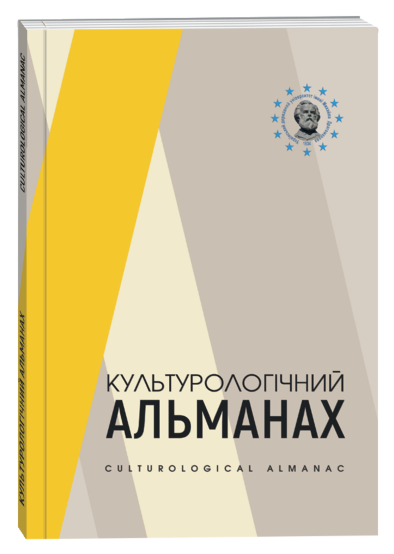WORLD, NATIONAL, ETHNIC CULTURES IN THE MODERN CULTURAL SPACE: A STRUCTURAL AND FUNCTIONAL APPROACH
DOI:
https://doi.org/10.31392/cult.alm.2022.3.27Keywords:
modern cultural space, world culture, national culture, ethnic culture, regional cultural tradition, post-folkloreAbstract
Globalization processes have radically changed the architecture of the world cultural space, influenced the coexistence of various cultures. Analyzing and rethinking these transformations is helped by structural-functional analysis, which allows you to examine not only structural, but also functional connections within the object of study, as well as its functional connections with the external environment. In the modern cultural space, according to the criterion of commonality of people, it is possible to distinguish three main structural elements: world, national and ethnic cultures, which is a complex construction of their combination. World culture today plays an important role in uniting the world community into a single human community and in many ways produces tastes, offers certain standards, forms attachments, and produces value attitudes. The sphere of world material culture takes on a standardized form, while differences in cultural production have moved to the level of spiritual culture, to the realm of worldview, worldview, consciousness, to the production and nurturing of one’s own values, norms and tastes, which constitutes the mechanism of reproduction of the cultural identity of a certain people. The layer of national culture is manifested through a set of values, cultural forms, worldviews, orientations, and artistic tastes that are created within the boundaries of the national state. Currently, the concept of a networked (rather than territorially oriented) way of existence of national culture has developed, as a set of public spheres formed by key actors of national cultural life and endowed with an expressive identity. Ethnic culture, or regional (local) cultural tradition, is another factor of the modern cultural space, which performs the role of identifier and preservation of ethnic features, despite modern globalization influences. The structural-functional approach allows us to move from a simplified view of culture to a more complex multi-layered picture of the functioning of modern culture.
References
Ануфрієв А. (2002). Етнокультура в системі національної культури. Українознавство. Число 2(3). URL: http://archive.ndiu.org.ua/fulltext.html?id=2396 (дата звернення: 18.06.2022).
Герчанівська П. (2015). Культурологія : термінологічний словник. Київ : Національна академія керівних кадрів культури і мистецтв. 439 с.
Герчанівська П. (2016). Структурний аналіз: культурологічний аспект. Міжнародний вісник: культурологія, філологія, музикознавство. Вип. 2(7). С. 3–11.
Глебова Н. (2012). Вплив глобалізаційних процесів на етнокультурні ідентичності у сучасному вимірі. Соціологічні студії. № 1. С. 22–28. URL: https://core.ac.uk/download/pdf/153585195.pdf (дата звернення: 26.07.2022).
Гриценко О. (2019). Культурний простір і національна культура: теоретичне осмислення та практичне формування : монографія. Київ : Інститут культурології НАМ України. 256 c.
Ґелнер Е. (2003). Нації та націоналізм. Націоналізм. Пер. з англ. Київ : Таксон. 300 с.
Денисюк Ж. (2018). Репрезентація етнокультурних цінностей у текстах постфольклору. Вісник Національної академії керівних кадрів культури і мистецтв. № 1. С. 62–66.
Денисюк Ж. (2017). Цінності етнокультури в умовах соціокультурних трансформацій. Культура і сучасність. № 2. С. 15–20.
Кісь Р. (2005). Глобальне – національне – локальне (соціяльна антропологія культурного простору). Львів : Літопис. 300 с.
Мазурик З. (2013). Неофункціональне розуміння культури як шанс. Збруч. 16 квітня. URL: https://zbruc.eu/node/5809 (дата звернення: 10.06.2022).
Нікішенко Ю. (2018). Матеріальна культура та окремі її складові в працях етнологів та культурологів. Вісник Київського національного університету культури і мистецтв. Серія «Музеєзнавство і пам’яткознавство». Вип. 1. С. 103–112.
Нікішенко Ю. (2004). Поняття «етнічна культура» і «традиційна культура» в етнокультурології. Наукові записки НаУКМА. Теорія та історія культури. Т. 24. С. 4–13. URL: http://ekmair.ukma.edu.ua/bitstream/handle/123456789/8253/Nikishenko_Poniattia_etnichna_kultura.pdf?sequence=3&isAllowed=y (дата звернення: 19.06.2022).
Садовенко С. (2021). Хронотоп української народної художньої культури як діалектична єдність традиційних та інноваційних моделей буття у просторі й часі XXI століття. Культура і сучасність. № 2. С. 29–38.
Цимбал Т. (2011). Діалектика національного та транснаціонального в сучасному світі. Вісник Харківського національного університету імені В.Н. Каразіна. Серія «Теорія культури і філософія науки». № 940. URL: https://periodicals.karazin.ua/thcphs/article/view/1986/1667 (дата звернення: 03.06.2022).
McLuhan M. (1964). Understanding Media: The extensions of Man. New York : McGraw-Hill. 318 р.








